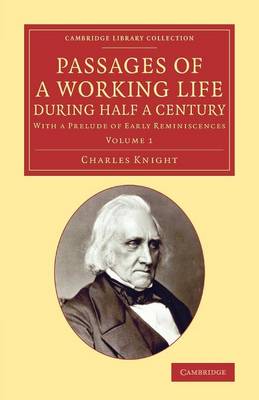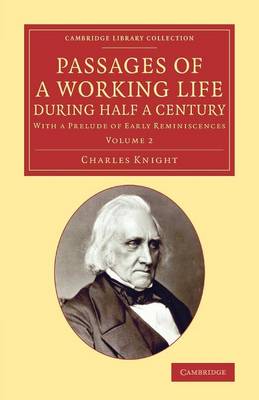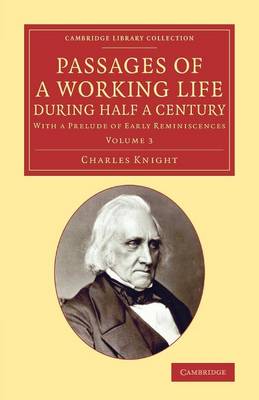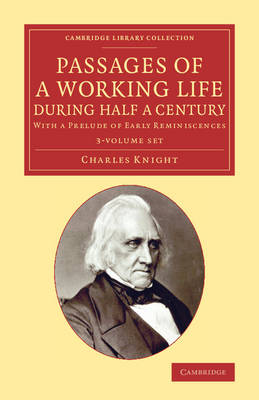Cambridge Library Collection - History of Printing, Publishing and Libraries
3 primary works • 6 total works
Volume 1
Charles Knight (1791–1873), the son of a Windsor bookseller, was apprenticed to his father at fourteen. He read widely and systematically, and began to buy, collect and sell rare books. He also worked as a journalist, and, on moving to London, set up as a publisher, then took to freelance writing, and acted as manager of the publications of the Society for the Diffusion of Useful Knowledge. In 1832, he launched the Penny Magazine, offering the working classes useful information, within a moral context of thrift and self-discipline. Knight continued to write - on Shakespeare, on Caxton, on English history - while at the same time being at the centre of the British publishing industry. His 1864–5 three-volume autobiography (reissued here in its posthumous 1873 edition) provides insights into the economics as well as the personalities of the mid-Victorian publishing world. Volume 1 covers Knight's life up to 1826.
Volume 2
Charles Knight (1791–1873), the son of a Windsor bookseller, was apprenticed to his father at fourteen. He read widely and systematically, and began to buy, collect and sell rare books. He also worked as a journalist, and, on moving to London, set up as a publisher, then took to freelance writing, and acted as manager of the publications of the Society for the Diffusion of Useful Knowledge. In 1832, he launched the Penny Magazine, offering the working classes useful information, within a moral context of thrift and self-discipline. Knight continued to write - on Shakespeare, on Caxton, on English history - while at the same time being at the centre of the British publishing industry. His 1864–5 three-volume autobiography (reissued here in its posthumous 1873 edition) provides insights into the economics as well as the personalities of the mid-Victorian publishing world. Volume 2 covers the 1820s to the late 1840s.
Volume 3
Charles Knight (1791–1873), the son of a Windsor bookseller, was apprenticed to his father at fourteen. He read widely and systematically, and began to buy, collect and sell rare books. He also worked as a journalist, and, on moving to London, set up as a publisher, then took to freelance writing, and acted as manager of the publications of the Society for the Diffusion of Useful Knowledge. In 1832, he launched the Penny Magazine, offering the working classes useful information, within a moral context of thrift and self-discipline. Knight continued to write - on Shakespeare, on Caxton, on English history - while at the same time being at the centre of the British publishing industry. His 1864–5 three-volume autobiography (reissued here in its posthumous 1873 edition) provides insights into the economics as well as the personalities of the mid-Victorian publishing world. Volume 3 covers the 1850s, and continues up to 1865.
Charles Knight's The Old Printer was first published in 1854 and is partly a biography of William Caxton and partly an account of the development of the printing press and its role in English literature from the fifteenth century. William Caxton was not only the first printer in England, but also a prolific translator and importer of books. He established a printing press at Westminster and among the books printed there were Chaucer's Canterbury Tales and The Subtil Histories and Fables of Esop. Knight describes Elizabethan reading habits and traces the development of the types of books, papers and magazines that were most popular with the reading public in the mid-nineteenth century. The author is particularly interested in the availability of cheap popular literature as he regards this as an indication of the democratisation of society.
Passages of a Working Life during Half a Century 3 Volume Set
by Charles Knight
Published 31 July 2014
Charles Knight (1791-1873), the son of a Windsor bookseller, was apprenticed to his father at the age of fourteen. He read widely and systematically, and began to buy, collect and sell rare books. He also worked as a liberal-leaning journalist, and, on moving to London, set up as a publisher, then took to freelance writing, and acted as manager of the publications of the Society for the Diffusion of Useful Knowledge. In 1832, he launched the Penny Magazine, offering the working classes useful information, within a moral context of thrift and self-discipline. Knight continued to write - on Shakespeare, on Caxton, on English history - while at the same time being at the centre of the British publishing industry. His 1864-5 three-volume autobiography (reissued here in its posthumous 1873 edition) provides insights into the economics as well as the personalities of the mid-Victorian publishing world.
Passages of a Working Life during Half a Century: Volume 1
by Charles Knight
Published 5 December 2014
Charles Knight (1791-1873), the son of a Windsor bookseller, was apprenticed to his father at fourteen. He read widely and systematically, and began to buy, collect and sell rare books. He also worked as a journalist, and, on moving to London, set up as a publisher, then took to freelance writing, and acted as manager of the publications of the Society for the Diffusion of Useful Knowledge. In 1832, he launched the Penny Magazine, offering the working classes useful information, within a moral context of thrift and self-discipline. Knight continued to write - on Shakespeare, on Caxton, on English history - while at the same time being at the centre of the British publishing industry. His 1864-5 three-volume autobiography (reissued here in its posthumous 1873 edition) provides insights into the economics as well as the personalities of the mid-Victorian publishing world. Volume 1 covers Knight's life up to 1826.




